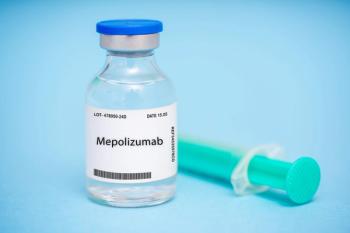
Rebecca Dent, MD, MSc, of the National Cancer Center in Singapore, gives insights on the use of antibody-drug conjugates (ADCs) in early breast cancer treatment.

Rose is an editorial director at The American Journal of Managed Care® (AJMC®).
She has a BA in journalism & media studies and Spanish from Rutgers University. You can connect with Rose on LinkedIn.

Rebecca Dent, MD, MSc, of the National Cancer Center in Singapore, gives insights on the use of antibody-drug conjugates (ADCs) in early breast cancer treatment.

New KEYNOTE-B96 data add to previous results showing progression-free survival (PFS) and overall survival (OS) improvements vs placebo.

Stephen Freedland, MD, of Cedars-Sinai, discussed enzalutamide and leuprolide's potential to improve overall survival without sacrificing quality of life in prostate cancer.

Nirsevimab significantly reduced RSV hospitalizations in infants, reinforcing public health recommendations for its use during the RSV season.

An innovative artificial intelligence (AI) tool enhanced alopecia areata assessment and improved treatment adherence.

Allergen immunotherapy was associated with reduced medication use and improved asthma control for up to 9 years.

Explore the implications of the Most Favored Nation Order on US drug pricing reform and its potential impact on patient access and innovation.

Telemedicine improved the quality of life and inhaler technique among patients with advanced-stage chronic obstructive pulmonary disease (COPD).

The approval is the first in more than a decade for an idiopathic pulmonary fibrosis treatment.

The approval of remibrutinib for patients with chronic spontaneous urticaria was supported by data from the phase 3 REMIX-1 and REMIX-2 clinical trials.

Emma Guttman-Yassky, MD, PhD, discusses the long-term efficacy of deuruxolitinib in alopecia areata.

The approval of paltusotine (Palsonify; Crinetics) marks the first for a once-daily, oral therapy to treat acromegaly.

Female patients with chronic spontaneous urticaria (CSU) face greater disease severity and burdens, particularly in midlife, a study found.

The adoption of technologies like telehealth and health information exchange increased over time, but hospitals in the most disadvantaged areas were behind.

The Rural Health Transformation Program invests $50 billion to enhance health care access and quality in rural America.

Mepolizumab showed significant real-world improvements in asthma outcomes, reducing exacerbations and corticosteroid use in severe eosinophilic asthma.

John Byrnes of Banner|Aetna emphasizes collaboration and data-driven strategies to enhance care quality, access, and affordability in health care.

Byoung Chul Cho, MD, PhD, of the Yonsei University College of Medicine, discussed outcomes in the COCOON trial of an enhanced dermatologic regimen with amivantamab-lazertinib treatment.

Efren Flores, MD, of Harvard Medical School and Massachusetts General Hospital, discussed the findings of a subanalysis of the Screen ASSIST tobacco cessation clinical trial.

Surbhi Singhal, MD, of the University of California Davis, discussed disparities in biomarker testing among patients diagnosed with stage IV nonsquamous non–small cell lung cancer (NSCLC).

Matias Sanchez, MD, a hematologist-oncologist at University of Illinois Health, discussed the latest advancements in value-based multiple myeloma care, including minimal residual disease strategies and innovative targeted therapies.

Emma Guttman-Yassky, MD, PhD, discusses promising hair regrowth results for alopecia areata treatments, emphasizing safety and rapid efficacy.

A new joint guideline from the American Heart Association and the American College of Cardiology emphasizes early treatment, close perinatal blood pressure monitoring, and incorporating the PREVENT risk calculator to personalize care.

Givinostat shows promise in delaying Duchenne muscular dystrophy (DMD) progression, enhancing mobility, and maintaining safety in long-term treatment.

Patients with severe sickle cell disease experienced significant quality of life improvements after receiving exagamglogene autotemcel gene therapy.

A new patient-centered methadone restart protocol enhances opioid use disorder treatment, improving safety and retention while personalizing care.

Targeted “Food is Medicine” interventions can help individuals with diet-sensitive chronic conditions improve their health, but nationally representative survey and qualitative interviews showed low awareness despite high interest among respondents.

Matias Sanchez, MD, a hematologist-oncologist at University of Illinois Health, discussed strategies to deliver cutting-edge multiple myeloma care while mitigating costs.

New findings demonstrate an association between increased cumulative depression genetic burden and multiple sclerosis (MS) disease activity.

The FDA approved zopapogene imadenovec, the first therapy for recurrent respiratory papillomatosis, providing an option beyond repeated surgeries to manage the rare condition.

259 Prospect Plains Rd, Bldg H
Cranbury, NJ 08512
© 2025 MJH Life Sciences®
All rights reserved.
